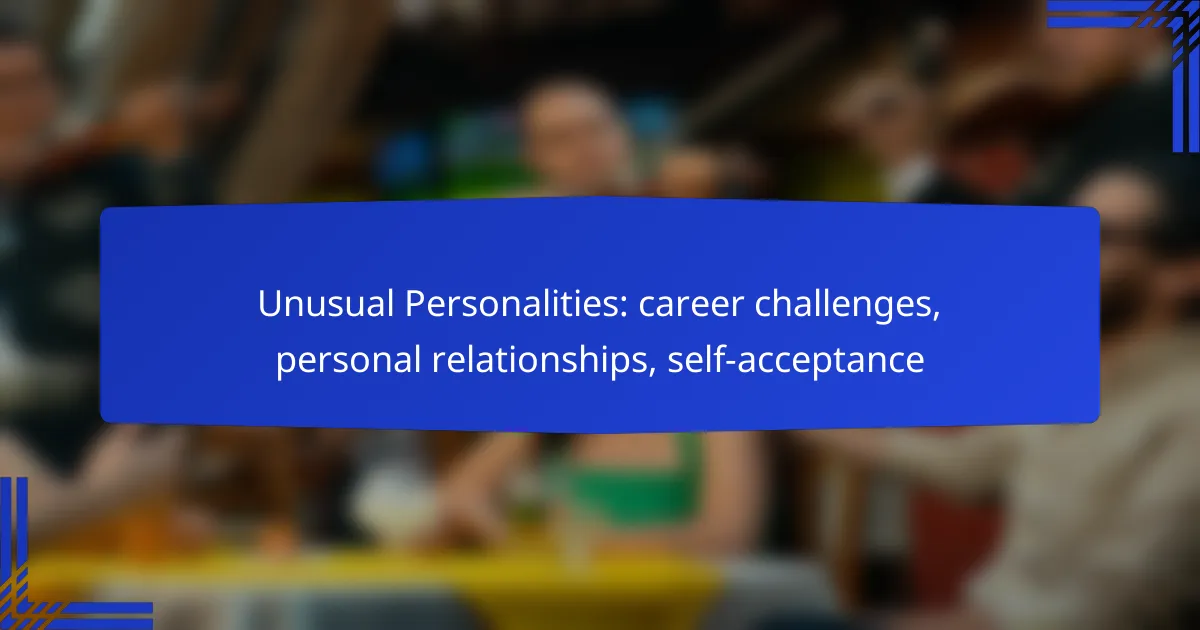Unusual personalities often navigate a complex landscape of career challenges and personal relationships, facing obstacles that can hinder their professional growth and emotional connections. Misunderstandings in communication and stigma in the workplace can create barriers, yet embracing their unique traits can open doors to fulfilling opportunities. By seeking environments that value diversity and fostering self-acceptance, individuals can enhance both their career prospects and personal relationships.

What career challenges do unusual personalities face in Canada?
Unusual personalities in Canada often encounter unique career challenges that can hinder their professional growth and job satisfaction. These challenges include difficulties in workplace integration, misunderstandings from colleagues, issues with job fit, and stigma during the hiring process.
Workplace integration difficulties
Individuals with unusual personalities may struggle to integrate into traditional workplace environments. Their distinct ways of thinking and interacting can clash with standard corporate cultures, leading to feelings of isolation or exclusion.
To improve integration, it is beneficial for these individuals to seek out inclusive workplaces that value diversity. Participating in team-building activities can also foster connections with colleagues and enhance collaboration.
Misunderstanding from colleagues
Colleagues may misinterpret the behaviors or communication styles of those with unusual personalities, leading to conflicts or strained relationships. This misunderstanding can stem from a lack of awareness or appreciation for different perspectives.
Encouraging open dialogue about individual differences can help mitigate these misunderstandings. Workshops on emotional intelligence and communication can also equip teams with the skills to better understand and support one another.
Job fit and satisfaction issues
Finding a job that aligns with their unique strengths and preferences can be challenging for individuals with unusual personalities. They may feel unfulfilled in roles that do not leverage their creativity or critical thinking abilities.
To enhance job satisfaction, it is crucial for these individuals to explore careers that allow for autonomy and innovation. Networking with professionals in niche fields can provide insights into fulfilling opportunities that match their distinct skill sets.
Stigma and bias in hiring
Unusual personalities often face stigma and bias during the hiring process, as employers may favor conventional candidates. This bias can limit opportunities for individuals who think outside the box or exhibit unconventional traits.
To combat this stigma, candidates should focus on showcasing their unique strengths and how they can contribute to a company’s success. Tailoring resumes to highlight relevant experiences and skills can also help in overcoming biases during hiring.

How can unusual personalities improve their career prospects?
Unusual personalities can enhance their career prospects by leveraging their unique traits and skills in specific roles that value diversity. Embracing their individuality while seeking environments that appreciate their differences can lead to fulfilling career paths.
Utilizing strengths in niche roles
Identifying and capitalizing on personal strengths is crucial for unusual personalities. Niche roles, such as creative positions in art, design, or technology, often benefit from unconventional thinking. For instance, a person with a unique perspective might excel in roles that require innovative problem-solving or out-of-the-box ideas.
Consider exploring industries like gaming, entertainment, or specialized consulting, where diverse viewpoints are not just accepted but celebrated. Tailoring your job search to these sectors can significantly enhance your career satisfaction and success.
Seeking supportive work environments
A supportive work environment can make a significant difference for individuals with unusual personalities. Look for companies that prioritize inclusivity and diversity, as these organizations are more likely to value your unique contributions. Research company cultures through employee reviews or networking to find workplaces that align with your values.
Additionally, consider roles in organizations that offer mentorship programs or employee resource groups. These can provide essential support and foster a sense of belonging, which is vital for personal and professional growth.
Networking with like-minded professionals
Building a network of like-minded professionals can open doors and create opportunities for unusual personalities. Attend industry events, workshops, or online forums where you can connect with others who share similar interests and values. Engaging in these communities can lead to collaborations and job referrals.
Utilize platforms like LinkedIn to join groups focused on your niche or interests. Regularly participating in discussions and sharing insights can help establish your presence and credibility within your field, ultimately enhancing your career prospects.
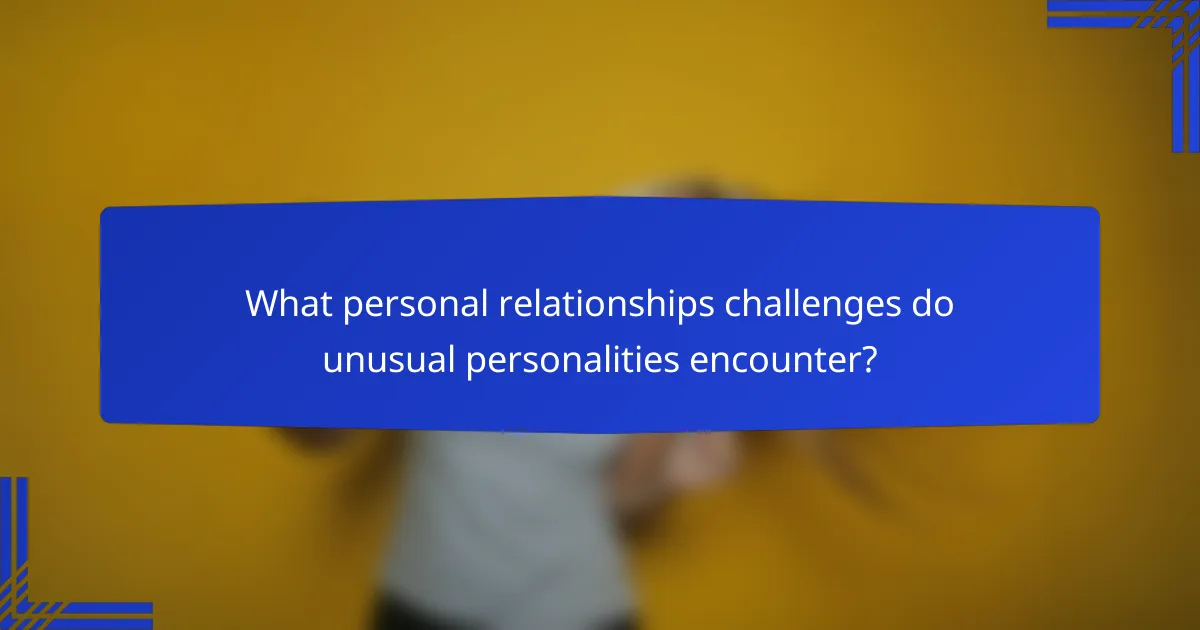
What personal relationships challenges do unusual personalities encounter?
Unusual personalities often face unique challenges in personal relationships, primarily due to differences in communication styles and emotional responses. These challenges can lead to misunderstandings, difficulties in forming connections, and struggles with intimacy.
Difficulty in social interactions
Individuals with unusual personalities may find social interactions daunting, often feeling out of sync with conventional social norms. They might struggle to read social cues, leading to awkward situations or misinterpretations of others’ intentions.
To navigate these interactions, it can be helpful to practice active listening and observe how others engage in conversation. Joining groups with shared interests can also provide a more comfortable environment for socializing.
Miscommunication with partners
Miscommunication is a common issue for those with unusual personalities, as their way of expressing thoughts and feelings may differ significantly from their partners. This can result in conflicts or feelings of frustration on both sides.
To improve communication, it is essential to establish clear and open dialogue. Using “I” statements to express feelings and seeking clarification when unsure can help bridge the gap in understanding.
Struggles with intimacy and vulnerability
Unusual personalities may find it challenging to open up emotionally, which can hinder intimacy in relationships. Fear of judgment or rejection often leads to a reluctance to share personal thoughts and feelings.
Building trust is crucial for overcoming these barriers. Taking small steps to share personal experiences and being receptive to a partner’s vulnerabilities can foster a deeper emotional connection over time.
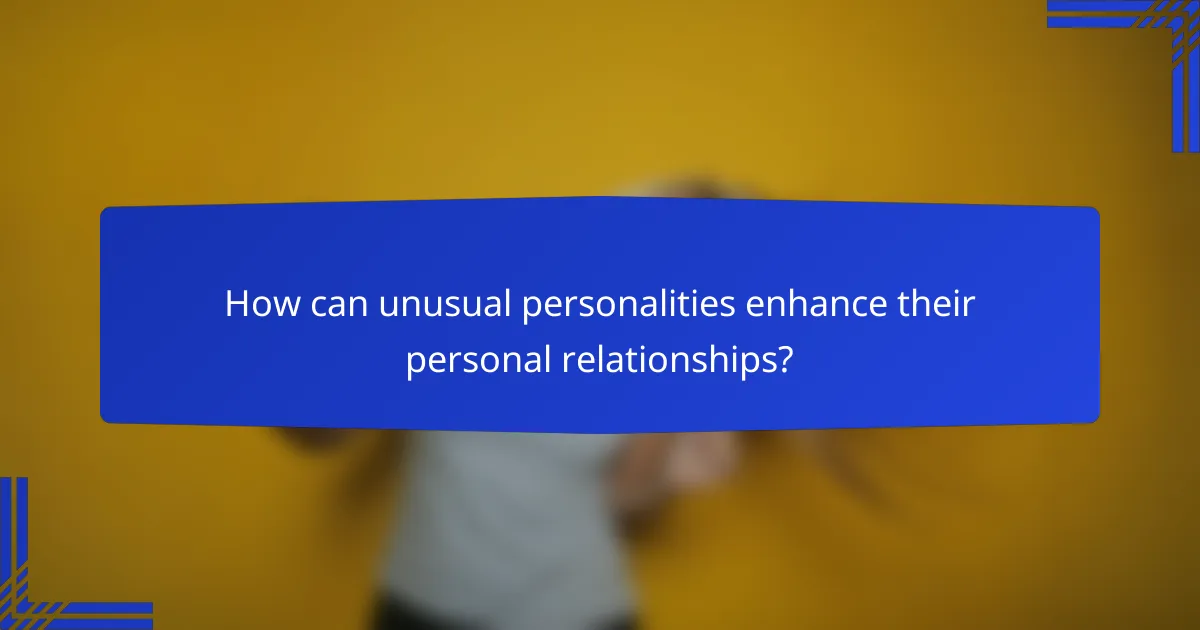
How can unusual personalities enhance their personal relationships?
Unusual personalities can enrich personal relationships through their unique perspectives and creativity. By embracing their distinct traits, they often foster deeper connections and understanding with others.
Practicing open communication
Open communication is essential for unusual personalities to express their thoughts and feelings clearly. This involves actively listening and sharing without fear of judgment, which can lead to stronger bonds. Regularly checking in with partners about feelings and expectations can help maintain clarity and prevent misunderstandings.
Consider setting aside time each week for honest discussions. This practice can help both partners feel valued and understood, enhancing the overall relationship dynamic.
Finding compatible partners
Identifying compatible partners is crucial for unusual personalities seeking fulfilling relationships. Look for individuals who appreciate uniqueness and share similar values or interests. Engaging in communities or activities that align with personal passions can increase the chances of meeting like-minded individuals.
Utilizing dating apps that cater to niche interests can also be beneficial. This targeted approach allows for more meaningful connections, as both parties are likely to appreciate each other’s distinctiveness.
Engaging in relationship-building activities
Participating in relationship-building activities can strengthen the bond between partners. Shared experiences, such as attending workshops, exploring new hobbies, or volunteering, can create lasting memories and deepen connections. These activities encourage teamwork and understanding, which are vital for unusual personalities.
Consider scheduling regular date nights or weekend adventures that focus on mutual interests. This not only fosters closeness but also allows both partners to express their individuality in a supportive environment.
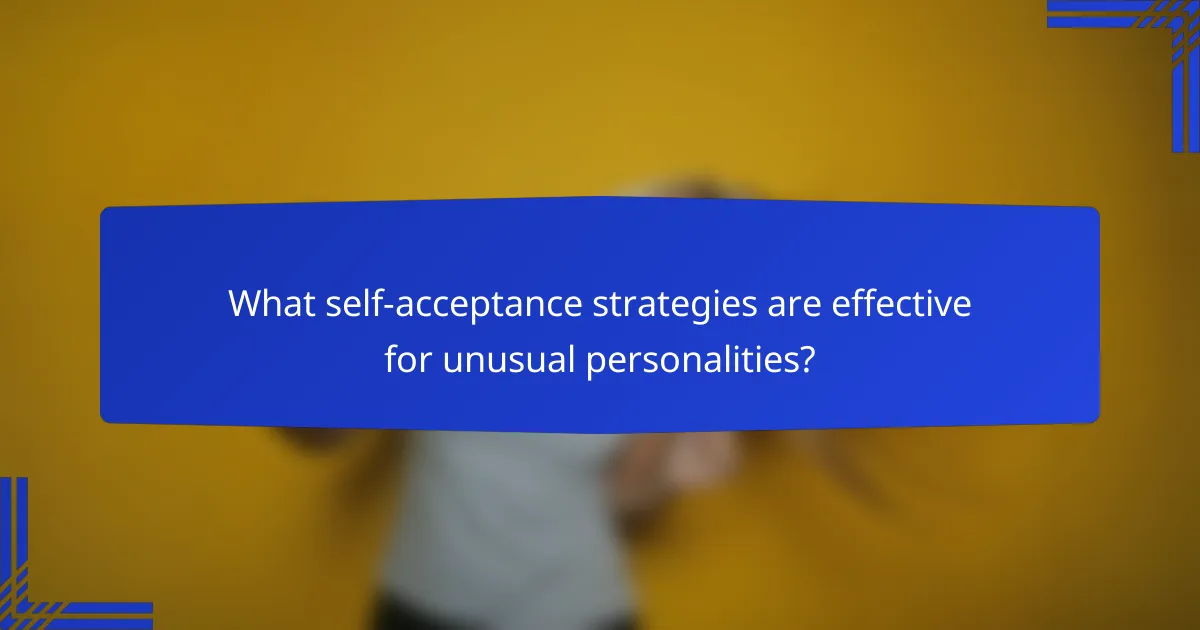
What self-acceptance strategies are effective for unusual personalities?
Effective self-acceptance strategies for unusual personalities include embracing individuality, seeking therapy or counseling, and joining support groups. These approaches help individuals recognize their unique traits, navigate personal challenges, and build supportive networks.
Embracing individuality
Embracing individuality involves recognizing and celebrating what makes you unique. This can include acknowledging personal quirks, interests, and perspectives that differ from societal norms. By valuing your distinct traits, you can foster a positive self-image and reduce feelings of inadequacy.
Consider keeping a journal to document your thoughts and experiences that highlight your individuality. Reflecting on your strengths can reinforce your self-acceptance. Engage in activities that align with your interests, as this can further enhance your sense of self.
Seeking therapy or counseling
Seeking therapy or counseling can provide valuable support for unusual personalities. A trained professional can help you explore your feelings, develop coping strategies, and work through challenges related to self-acceptance. Therapy can also offer a safe space to discuss personal experiences without judgment.
When choosing a therapist, look for someone who specializes in personality differences or unconventional traits. Sessions may vary in frequency, typically ranging from weekly to bi-weekly, depending on your needs. Be open about your goals to ensure the therapy is tailored to your unique situation.
Joining support groups
Joining support groups can connect you with others who share similar experiences and challenges. These groups provide a platform for sharing stories, gaining insights, and receiving encouragement from peers. Engaging with a community can help reduce feelings of isolation and promote self-acceptance.
Look for local or online support groups focused on personality diversity or mental health. Many groups meet regularly, either in person or virtually, making it easier to find one that fits your schedule. Participating actively can enhance your sense of belonging and reinforce your journey toward self-acceptance.
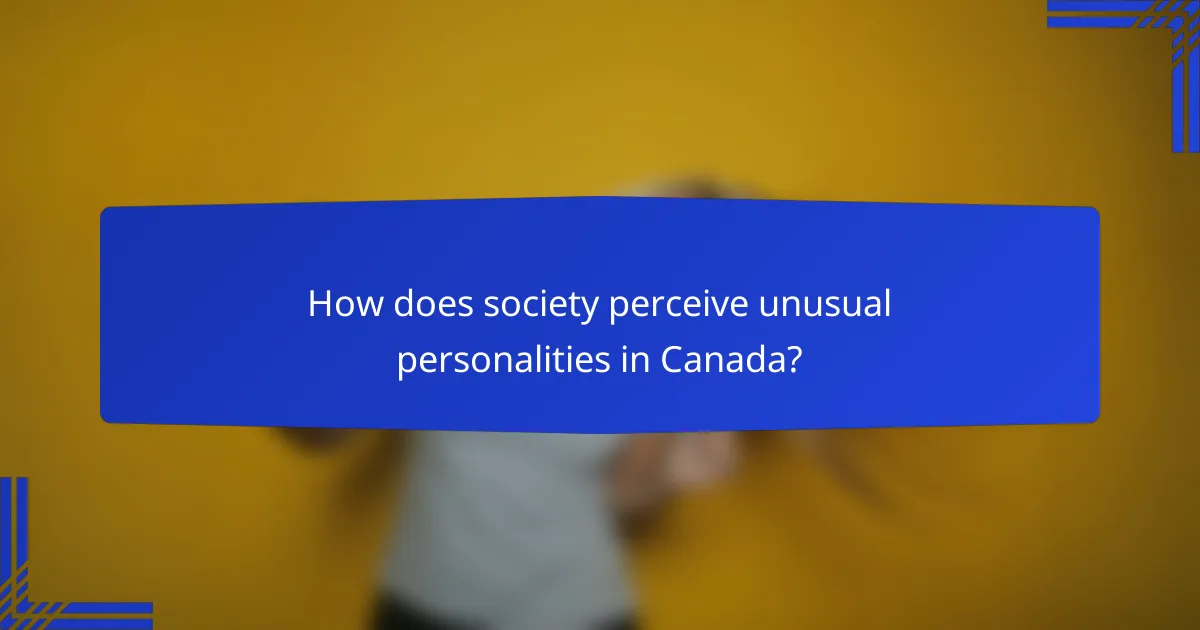
How does society perceive unusual personalities in Canada?
In Canada, society often views unusual personalities through a lens of curiosity and misunderstanding. While there is a growing acceptance of diversity, individuals with atypical traits may still face challenges in social and professional settings.
Media representation and stereotypes
Media plays a significant role in shaping perceptions of unusual personalities in Canada. Often, these individuals are portrayed through exaggerated stereotypes, which can lead to misconceptions and stigmatization. For example, characters in films or television shows may be depicted as eccentric or socially awkward, reinforcing negative stereotypes.
However, there are also positive representations that highlight the strengths and unique perspectives of unusual personalities. Documentaries and reality shows that focus on individuals with atypical traits can foster understanding and empathy, showcasing their contributions to society.
To counteract negative stereotypes, it’s essential for media producers to present more nuanced and realistic portrayals. This can help shift public perception towards a more accepting view of diversity in personality types.
